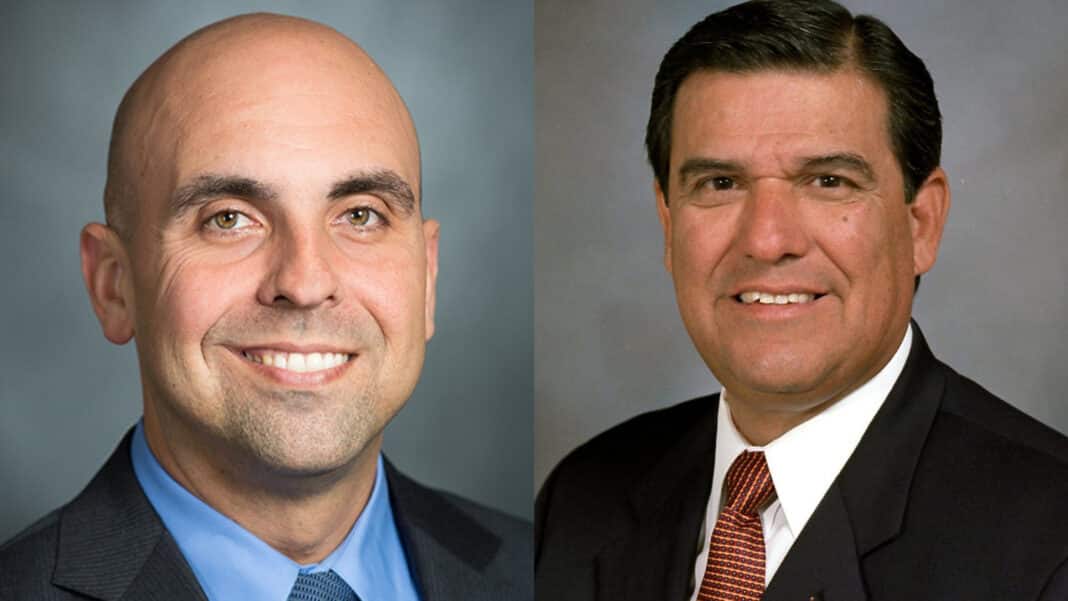The Texas House approved legislation that would pave the way for the Rio Grande Valley’s first public law school.
State Rep. Armando “Mando” Martinez, D-Weslaco spearheaded a bill this legislative session that would allow any public university system to plant a law school in the region. The state House passed the bill on Thursday with a 97-47 vote — 10 fewer supportive representatives than when Martinez first proposed a law school in the 2019 legislative session.
The baton has now been passed to state Sen. Eddie Lucio, D-Brownsville, who will be leading the bill, House Bill 695, through the Senate.
“We are looking forward to getting it in the Senate and it being carried and passed, so that our students can have another opportunity in the Rio Grande Valley to accomplish their dreams,” Martinez said.
If the bill passes as it is there, the last step to it becoming a law is a signature from Gov. Greg Abbott.
The legislation would allow a public university system to open a law school in either Hidalgo or Cameron counties, and the state would begin to pour funds into operations and maintenance starting 2027.
Martinez says he is confident that Lucio will carry the bill through its next stage.
“I am sure that he is capable of passing it there in the Senate,” he said. “So that way, working together, we can make this dream a reality for the Rio Grande Valley.
Lucio’s chief of staff, Ruben O’Bell, said the senator has been advocating for a local law school for longer than a decade now. Lucio has attempted to pass legislation similar to House Bill 695 before, the first time being in 2007.
It is for this reason O’Bell believes Lucio is fit to lead the bill through the Senate.
“So it was just, I would say, a natural feeling to be able to carry it because we have the background for it,” he said.
The challenge Lucio will face, O’Bell said, is convincing other senators of the need for more attorneys in South Texas. Though he is uncertain whether a feasibility study will be conducted, O’Bell said thorough research is imperative “in order for a sincere and genuine conversation to get started, so it has got to be done to move forward.”
The attorney-to-residents ratio is more than double the state’s average, according to the State Bar of Texas Department of Research & Analysis, which found that in Texas, there is one attorney for about every 311 residents. In the McAllen-Edinburg-Mission area, that ratio is to one for every 805.
Then for the Brownsville-Harlingen area, that ratio rises even higher to one attorney for every 736 residents.
There are currently five public universities in the state with a law school, and four private institutions, of which the closest school to the Valley is San Antonio’s St. Mary’s School of Law.
The main drive of planting a local law school, O’Bell added, is to boost retention rates of local students pursuing law degrees.
“We want our potential law school candidates to attend a law school here so they can stay here,” he said. “We lose a lot of them to other cities across the state and even out of state. Over the years we have seen plenty of interns and students doing other kinds of fellow programs that end up working with other offices, and very few come back.”
Martinez echoed a similar sentiment.
“The importance of it is to create opportunity for our students and the people of the Rio Grande Valley,” he said.
“We deserve it. We have a medical school, we have a lot of professionals and we want to be able to provide this so our students can continue to seek higher professions and not have to drive over 300 miles to find a law school.”
Edinburg Mayor Richard Molina was in Austin on Thursday and witnessed the state House passing the bill.
“I mean, this is big what you’ve done, this is life changing for the Valley,” Molina said in a video provided by the city. “The city of Edinburg definitely supports the efforts you are doing and people realize the economic impact this is going to have in the future.”




